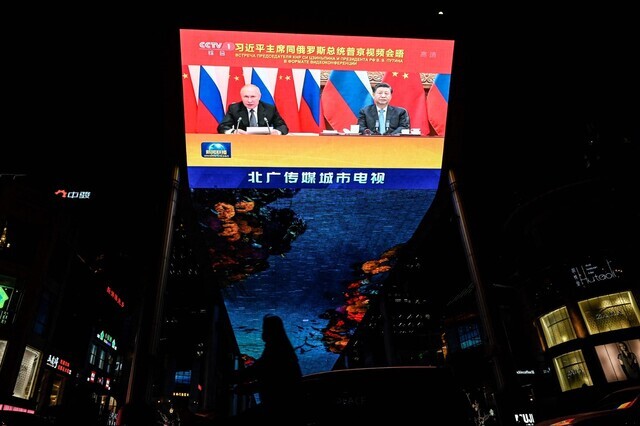hankyoreh
Links to other country sites 다른 나라 사이트 링크
[Column] An end-of-war declaration and Ukraine are more related than you might think


The world is currently faced with a serious question: What will happen if Russia attacks Ukraine at the same time China decides to reunify with Taiwan by force?
Vladimir Putin, Russia’s president, is currently playing a dangerous game along the border with Ukraine. With Russia deploying nearly 100,000 troops to its border with Ukraine, the US and European countries are warning of “strong economic sanctions” and demanding that Russia not cross any lines.
Meanwhile, China is keeping a very close eye on Putin’s gamble. Chinese President Xi Jinping has publicly declared that Taiwan will be reunified with the mainland in order to realize the “great rejuvenation of the Chinese nation,” and that if peaceful reunification is impossible, the country will be unified by force. If the United States and its allies fail to respond to Russia's offensive, China is more likely to take similar actions.
Of course, at the moment, China’s domestic political and economic situation or military capabilities are not sufficient to achieve such goals. However, things may look quite different in 2027, when the Chinese military’s modernization plan is completed and Xi is likely to extend his term for the fourth time. Or what about in 2030, when China’s economy is expected to surpass that of the US — what will happen if China and Russia decide to join forces on the issues of Taiwan and Ukraine? And what about the possibility of an incidental clash occurring along these borders? These are the sorts of questions strategists and experts from many countries are currently asking.
If something were to happen in Taiwan, would Korea look on in indifference? The Taiwan issue has been closely related to the Korean Peninsula from the very beginning. Mao Zedong, who came out of the Chinese Civil War victorious in 1949 and established the People’s Republic of China, was preparing to overthrow the Kuomintang government which had fled to Taiwan. However, in 1950, China, along with the Soviet Union, supported North Korea’s invasion of South Korea, and as the US dispatched the 7th Fleet to the Taiwan Strait, China’s plans for the occupation of Taiwan fell apart.
Oh Byung-soo, a researcher at the Northeast Asian History Foundation, says that “In the early days of the Cold War, Chiang Kai-shek’s Kuomintang government launched a covert operation by sending fighter jets to various parts of mainland China under the slogan of ‘recovering the mainland,’ often using the USFK base in Gunsan as a stopover.”
“Since the Korean Peninsula is always in the middle of regional disputes, the key task for Korea is to create a framework through which it can exercise its political power while trying to ease conflicts surrounding it,” Oh added.
Now that the Taiwan issue has resurfaced as the most sensitive security issue in East Asia, I wonder what the Blue House and foreign affairs and security officials are making of this situation and whether they are considering any countermeasures.
In the joint statement after the summit between the US and South Korea in May, the leaders of the two nations mentioned the need to “emphasiz[ing] the importance of maintaining peace and stability in the Taiwan Strait.” It was the first time any joint document between the US and South Korea made mention of the Taiwan issue.
More recently, on Dec. 3, the “stability of the Taiwan Strait” was once again mentioned in a joint statement following the US-ROK Security Consultative Meeting. Although the South Korean government is conscious of China and is playing down the meaning of these words, there is a serious question about what kind of action South Korea would take in the event of an armed conflict between the US and China over Taiwan. It would undoubtedly be a tough spot for South Korea to be in, given its close alliance with the US.
If South Korea does not want to be at the forefront of a military confrontation with China, it must also play a role in multilateral diplomacy to prevent China from disrupting regional peace under the pretext of “unification.” This is because maintaining peace in East Asia is in the national interest of South Korea, and its status as not having picked one side.
As a member of the G10, South Korea must expand the role and scope of its diplomacy beyond domestic politics and the Korean Peninsula. Only then can the issues of denuclearization and peace on the Korean Peninsula be resolved more effectively.
Although the South Korean government has put considerable effort into the process of realizing an end-of-war declaration in recent months, this is still not enough. Finally moving past the nearly 70 years of a ceasefire and achieving denuclearization and establishing a peace regime should be a given. But it’s just as important to choose the most adequate path to get to these goals. Since the 2019 US-DPRK summit in Hanoi ended in a “no-deal” situation, the road to peace has become much more complicated as the rift between the US and China has also deepened.
Recently, however, South Korea’s diplomatic power has shifted its focus to getting an end-of-war declaration inked as fast as possible in order to achieve the feat before Moon is out of office.
In the process, however, expectations for China to bring North Korea to the dialogue table were set high, which led some to believe South Korea was being overly biased toward China in this regard. Moreover, Chung Eui-yong, South Korea’s minister of foreign affairs, said that China’s “assertive” diplomacy is "only natural" — remarks that resulted in growing doubts about the end-of-war declaration from the US side.
Both the US and China are simply using this end-of-war declaration issue to pull South Korea closer to their side. As such, it doesn’t appear that any meaningful declaration will be made between the relevant four parties any time soon.
In order to get through this turbulent era in which conflicts between great powers have become increasingly acute, countries in similar positions must work together to reduce risks and increase cooperation. This may be the motivation behind Moon Jae-in’s recent visit to Australia, where he emphasized the importance of diversification of the supply chain for rare earth elements, strengthening security cooperation and freedom of navigation in the South China Sea.
Showing interest in and engaging with major issues of international importance are what enhance a country’s diplomatic power. Current examples of such issues include peace in Ukraine and Taiwan, the reorganization of high-tech supply chains, and the improvement of democracy and human rights.
Please direct questions or comments to [english@hani.co.kr]

Editorial・opinion
![[Column] Season 2 of special prosecutor probe may be coming to Korea soon [Column] Season 2 of special prosecutor probe may be coming to Korea soon](https://flexible.img.hani.co.kr/flexible/normal/500/300/imgdb/original/2024/0426/3317141030699447.jpg) [Column] Season 2 of special prosecutor probe may be coming to Korea soon
[Column] Season 2 of special prosecutor probe may be coming to Korea soon![[Column] Park Geun-hye déjà vu in Yoon Suk-yeol [Column] Park Geun-hye déjà vu in Yoon Suk-yeol](https://flexible.img.hani.co.kr/flexible/normal/500/300/imgdb/original/2024/0424/651713945113788.jpg) [Column] Park Geun-hye déjà vu in Yoon Suk-yeol
[Column] Park Geun-hye déjà vu in Yoon Suk-yeol- [Editorial] New weight of N. Korea’s nuclear threats makes dialogue all the more urgent
- [Guest essay] The real reason Korea’s new right wants to dub Rhee a founding father
- [Column] ‘Choson’: Is it time we start referring to N. Korea in its own terms?
- [Editorial] Japan’s rewriting of history with Korea has gone too far
- [Column] The president’s questionable capacity for dialogue
- [Column] Are chaebol firms just pizza pies for families to divvy up as they please?
- [Column] Has Korea, too, crossed the Rubicon on China?
- [Correspondent’s column] In Japan’s alliance with US, echoes of its past alliances with UK
Most viewed articles
- 1AI is catching up with humans at a ‘shocking’ rate
- 2Korea’s 1.3% growth in Q1 signals ‘textbook’ return to growth, says government
- 3[Column] Park Geun-hye déjà vu in Yoon Suk-yeol
- 4[Column] Season 2 of special prosecutor probe may be coming to Korea soon
- 5No good, very bad game for Korea puts it out of Olympics for first time since 1988
- 6Marriages nosedived 40% over last 10 years in Korea, a factor in low birth rate
- 7Division commander ordered troops to enter raging flood waters before Marine died, survivor says
- 81 in 5 unwed Korean women want child-free life, study shows
- 9[Column] Has Korea, too, crossed the Rubicon on China?
- 10Will NewJeans end up collateral damage in internal feud at K-pop juggernaut Hybe?